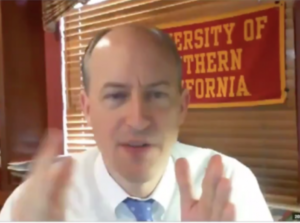At a high school graduation in Colorado, a student of Mexican-American heritage wanted to wear a sash to celebrate her bicultural identity. The school’s administration refused her permission with the justification that “allowing that regalia would ‘open too many doors.’” The student, Naomi Peña Villasano, sued the school but a federal judge last Friday upheld the decision barring her from wearing the sash. According to an article in the New York Times, at the graduation on Saturday, Ms. Villasano flouted the ruling and wore the sash anyway, apparently without incident. The article points out that Ms. Villasano’s case comes amid disputes elsewhere about what is protected free speech at commencement ceremonies. In Oklahoma on Thursday, the State Legislature overrode Gov. Kevin Stitt’s veto of a bill allowing students to wear Native American regalia at high school and college graduations.
In fact, schools in the US have recently become flashpoints for disputes that reflect the stark polarization in the political climate in the country as a whole. In Virginia, that was seen recently in new standards for teaching US history, with a first version of the standards downplaying the mistreatment of Native Americans, who in fact were described as the first “immigrants” to America. In many states, history curricula have been changed to align with Republican views opposing teaching the less savory sides of US history, such as the effects of slavery on the situation of African Americans today. Discussing sexual orientation in schools has also been a target, especially any introduction of topics related to LGBTQ+. That has led to book bans in many localities, including in the county next to mine in Virginia, Hanover County. There a local organization recently gave the school board a list of around 100 books it wanted banned. According to a news report from a local TV station, the group who submitted the proposed ban-list highlighted reasons ranging from content like “alternate gender ideologies” and “controversial social and racial commentaries,” to “alternate sexualities” and “self-harm.” A parent in the report commented, “We have seen this before. The Nazis have tried to burn books and erased the contents of those books.”
Indeed, the trend is very worrisome, as removing books from circulation stifles the ability of children to learn from the experiences of fictional characters (or of historical figures) that might mirror or illuminate their own lives and help them with the development of their personal identities. On a more positive note, I heard today that the English Department at my university (VCU) is seeing an uptick in the number of declared English majors entering the institution. The reason, according to the Department Chair: young people’s opposition to book banning.



















